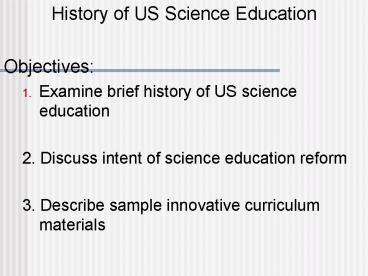History of US Science Education - PowerPoint PPT Presentation
1 / 9
Title:
History of US Science Education
Description:
History of US Science Education Objectives: Examine brief history of US science education 2. Discuss intent of science education reform 3. Describe sample innovative ... – PowerPoint PPT presentation
Number of Views:48
Avg rating:3.0/5.0
Title: History of US Science Education
1
- History of US Science Education
- Objectives
- Examine brief history of US science education
- 2. Discuss intent of science education reform
- 3. Describe sample innovative curriculum materials
2
- History of Science Education in the US
- 1800-1910
- 1800-1860
- Mostly agricultural society
- Science education involved memorizing facts
- 1860-1880
- Pestalozzis Object Teaching emphasized
concrete, student-centered instruction using
experiment rather than lecture - Kalamazoo Decision funded high schools with taxes
- Cities and industries grew requiring
technologically educated workers - 1890-1910
- Baileys Nature Movement emphasized study of
plants, animals as a way to give city students an
appreciation for nature - College science teaching begins to influence high
school curriculum - Committee of Ten separates elementary and
secondary science curriculum, decreasing
influence of discipline specific college ed. - 1910-1955
- 1. 6-3-3 grade organization becomes widespread
3
- Craigs elementary curriculum results in science
content readers - Traditional ordering of disciplines emerges
- 7-9 grades typically learn general science
- Biology, Chemistry, Physics taught in that
sequence in high school - General Education for all students more widely
advocated - Appreciation for science applications in society
grows - Technology advancements of WWII filter into
public schools - Chemistry and Physics make great advances
(Manhattan Project) - 1955-1970
- Economy and population growth
- Launch of Sputnik by USSR triggers major reforms
- Goal of more scientists and mathematicians so US
can compete - Many new curriculum project funded less spent
training teachers - Emphasis on inquiry learning and the nature of
science - Laboratory work increases
- 1970-1980
- 1. Dissatisfaction with Sputnik reforms
4
- US not producing the scientists expected
- Science education too discipline specific, too
theoretical, too hard - Teachers didnt buy into inquiry learning as
expected - Individualized curricula developed
- ISCS three level junior high program
- Activities and experiments emphasized
- Self-pace minicourses became the norm
- 1980-1990
- US Education perceived as falling behind (again)
- Yager, 1982 Synthesis of multiple studies in
1970s - Direct science beyond its discipline base
- Goals should focus on Personal Needs, Societal
Needs, Academic Preparation, and Career Education - Technological, Communication, Information
Revolutions - Literate populace implies technological as well
as science concepts - Science education must combine all this with
societal issues
5
- 1990-2000
- Focus on education for all students
- Assessment and Accountability major focus
- Learned societies publish standards
- Benchmarks for Science Literacy (AAAS, 1993)
- National Science Education Standards (NRC, 1996)
- Government bodies hold schools accountable
- State standards developed
- Public schools must go through accreditation
- National Education Standards
- The scientifically literate person
- Analyze technical information and make informed
decisions - Reason logically and think scientifically about
everyday problems - Curious about the world ask questions know how
to find answers - Describe, explain, and predict natural phenomena
- Evaluate science/society issues from an informed
perspective - Understand scientific inquiry and scientific
knowledge
6
- Science Education Reforms Advocated
- Less emphasis on facts more on concepts and
inquiry - Less discipline specific more societal and
historical development of science as an
interdisciplinary enterprise - Integration of knowledge and process
- Studying fewer concepts in more depth
- Implement Inquiry as an instructional strategy,
not just a concept - Investigations extended over a period of time
- Using evidence to revise explanations
- Public communication of student ideas and work
- Management of ideas and information rather than
materials/equipment - Defend conclusions after analyzing data
- Innovative Instructional Materials
- Scope, Sequence, and Coordination
- NSTA initiative to teach general science,
biology, chemistry, and physics each year 6-13 - Emphasizes interdisciplinary and less-is-more
reform items
7
- B. Middle school level
- Great Explorations in Math and Science
- Modules on interdisciplinary topics
- Activity and engagement oriented
- Project WILD
- Environment and Conservation focus of
interdisciplinary topics - Use interest of students in wild animals as focus
- Science Education for Public Understanding
- Focus on chemicals and the roles in society
- Provide background for students to analyze
science/society issues - Integrated Science
- Tries to meet Benchmarks while following Scope,
Sequence ideas - Heavily supported by videos, internet, teacher
training, etc - Hands-on observations of familiar phenomena
8
- High school level
- BSCS Biology A Human Approach
- Emphasizes biology from a human perspective
- Distinguishing characteristics of humans
- Human place in biosphere science/society issues
- Biology A Community Context
- Ecology, evolution, and genetics are major focus
- Inquiry-based activities
- Science Conference activities require
cooperation, collaboration - Chemistry in the Community (ChemCom)
- a. American Chemical Society course emphasizing
chemistry/society - Problem solving relevant to students everyday
lives - Problem, laboratory, discussion, decision-making
approach - Conceptual Physics
- Tries to overcome fear of math-based physics
- Uses concepts and language rather than equations
9
- Standards On-Line
- A. Benchmarks for Science Literacy
- http//www.project2061.org/tools/benchol/bolintr
o.htm - B. National Science Education Standards
- http//www.nap.edu/readingroom/books/nses/html/
- C. North American Association for Environmental
Education - http//www.naaee.org/npeee/
- D. CT State Department of Education Standards
- http//www.state.ct.us/sde/dtl/curriculum/currsci.
htm - E. National Council on Geography Education
Standards - http//www.ncge.org/publications/tutorial/standard
s/































